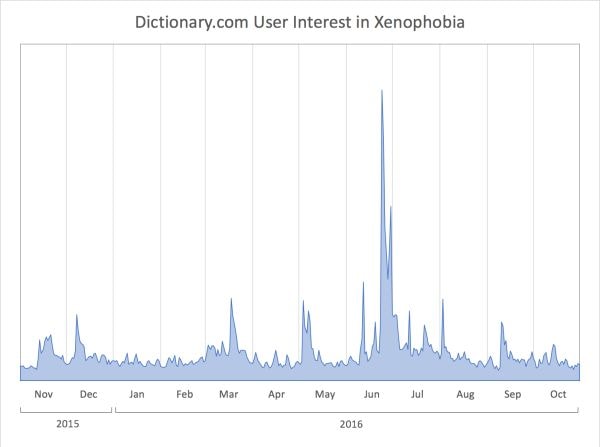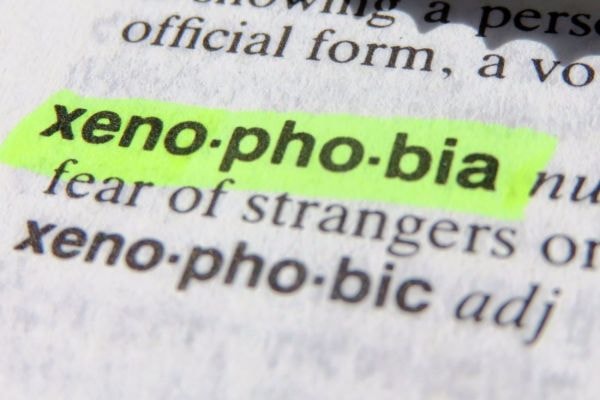Xenophobia - the sad keyword of 2016
(Baonghean) - At the end of each year, the online dictionary Dictionary.com chooses a word that can encapsulate the entire 12 months. Last year, the word chosen was “identity,” referring to all the discussions about gender, race, and sexuality that appeared in the news. This year, the website’s choice is a less optimistic word, and one that carries many implications after recent events.
Search volume skyrocketed
Dictionary.com's word of the year for 2016 is "xenophobia," chosen based on data on words searched by tens of thousands of curious users at any given time and judged to reflect a recurring theme in the news this year: fear of difference.
 |
| The time when users searched for the word xenophobia the most was after the UK's Brexit event. Photo: Internet |
On the dictionary page, the word xenophobia is defined in two ways, both reflecting the feelings of fear (and often isolationism) that pervaded the year's hot-button events such as the Brexit vote, the US election, debates over how to deal with Syrian migrants, racially motivated police shootings, and even arguments over which public toilets transgender people should use!
According to Dictionary.com, xenophobia is “fear or hatred of foreigners, people from other cultures, or strangers” or “fear or hatred of the customs, clothing, etc., of people who are culturally different.” In a statement, the authoritative online dictionary asserted: “This year has seen fear rise to the surface of cultural discourse.”
Searches for the keyword peaked on June 24, just one day after the British people voted to “Leave” or “Remain” in the European Union. On the day that not only the UK but the whole world was shocked by the referendum result, the number of people searching for “xenophobia” increased by 938%.
The second spike in searches for the word came a few days after US President Barack Obama mentioned it in a speech on June 29, referring to the “populist” tone of then-Republican presidential candidate Donald Trump. Obama accused Trump of embracing nativism or xenophobia: “That’s not the populist approach. It’s nativism or xenophobia or worse. Or it’s just plain cynicism.”
During his successful presidential campaign, Trump called for a ban on Muslims entering the United States and the construction of a border wall to crack down on what he saw as illegal immigration from Mexico. The xenophobia was evident in the president-elect’s remarks: “When Mexico lets people come across the border, they’re not the best people… They’re bringing drugs. They’re bringing crime. They’re rapists.”
 |  |
1. Search trends for the word “xenophobia” by users on online dictionary sites. Photo: Dictionary.com 2. “Xenophobia” is the keyword of 2016 according to Dictionary.com. Photo: Getty. |
According to Dictionary.com’s findings, the keyword “xenophobia” was a suitable choice following the recent anti-immigration sentiments targeting Syrian refugees. Explaining further in her press release, Dictionary.com CEO Liz McMillan said: “Xenophobia and other words associated with world news and political rhetoric reflect the worldwide concern over the sad rise of fear of difference in 2016, making it an obvious choice for the Keyword of the Year. While we can never know the exact reasons why “xenophobia” trended on our site this year, it reflects a desire among users to better understand the significant conversation surrounding global events.”
“The way of thinking that needs to be pushed back”
Looking back at recent years, for example in 2015, Dictionary.com crowned “identity” as the top word, citing the increased focus on personal topics of racial and gender identity, as well as sexual orientation among the general population during that year.
Even earlier, in 2014, the 20-year-old online dictionary chose the word “exposure” – referring to the spread of the Ebola epidemic in West Africa and the movements of the self-proclaimed Islamic State (IS) in the Middle East and on the internet – issues that dominated the hottest news of the year.
And so, it can be seen that this year's choice seems to be something very different from the previous ones. Rather than representing a growing trend in social dialogue or the breadth and impact of the news, xenophobia - the distillation of a worldwide emotion - seems to represent something much deeper and more troubling.
Robert Reich, a professor of public policy at the University of California, Berkeley, and former US Secretary of Labor under President Bill Clinton, analyzed Dictionary.com's choice, saying that the dictionary site "correctly chose 'xenophobia' as the keyword of the year" and "xenophobia can be seen as a reaction to increased globalization."
Speaking about the recent phenomenon of many people blaming ethnically diverse groups for some of the existing economic and social challenges, he said that such “scapegoats” are not new in world history, but they pose unpredictable dangers.
According to Reich, xenophobia is divisive, inviting harassment and bullying. Or worse, it turns people from being tolerant and empathetic to being disrespectful and hostile. As such, it is one of the greatest threats facing humanity, “xenophobia” is not a word to be celebrated, but rather a way of thinking to be repelled, an attitude to be eradicated from society.
On social networking sites, many users expressed their disappointment when they learned that this was the phrase that encapsulated the news characteristics of the past year, but most agreed that this was an extremely accurate choice. However, somewhere people still hope for a new beginning, so that in the coming year, love will replace the fear that people have for each other, so that the keyword of 2017 can be a more positive, optimistic concept, not the sad trend that covered 2016.
Thu Giang
| RELATED NEWS |
|---|

